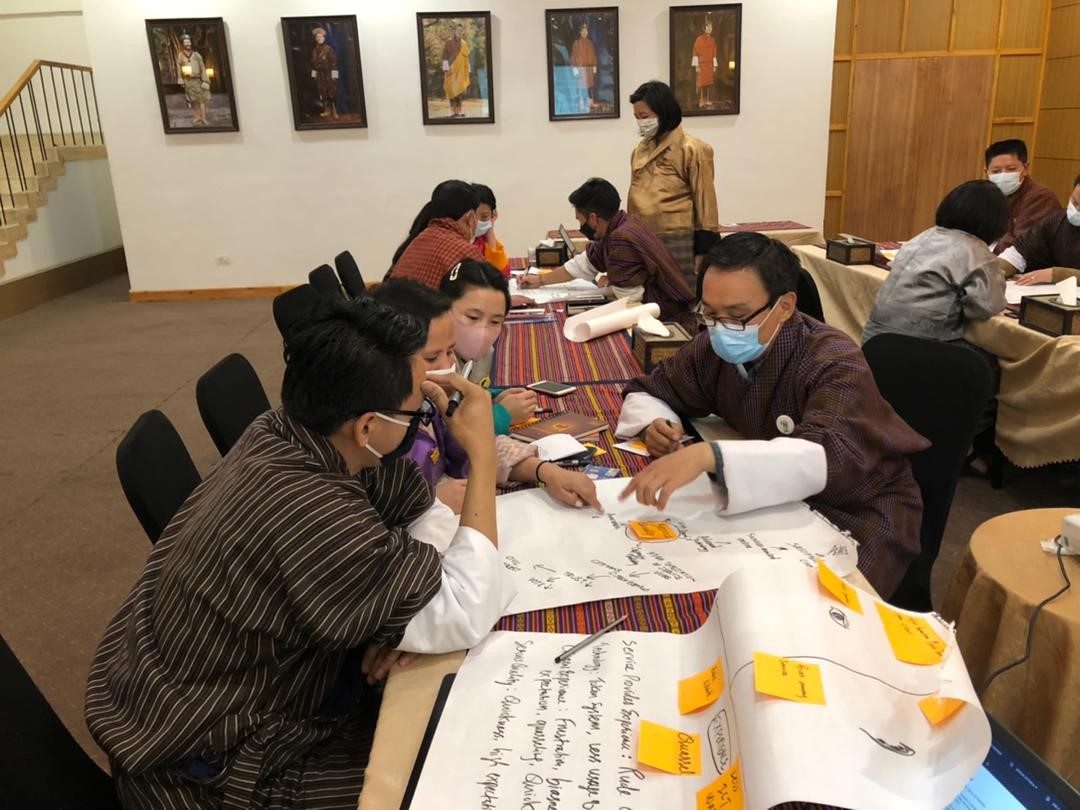Sensemaking workshop for service providers in May 2021 carried out as part of the enhancement of the public service delivery initiative.
Q&A: Part II of an interview series with RCSC Commissioner Lhendup Wangchu on improving public service delivery (19 May, 2021)
The Royal Civil Service Commission (RCSC), Public Service Delivery Division (PSDD) under Cabinet Secretariat, Gross National Happiness Commission (GNHC) and UNDP Bhutan are embarking on an initiative to improve public service delivery by engaging citizens in its monitoring and assessment. The pilot project is being led by RCSC.
Q. Please give us a brief update on the public service delivery initiative that RCSC is leading.
This initiative started in February 2021. Since then, the multi-agency task force has made tremendous progress, designing a citizen-centric Monitoring and Assessment Framework (MAF). We are now planning interventions to address some of the major issues that we identified with the help of citizens. For instance, we will soon be piloting a training on emotional intelligence and empathy for the service providers.
Q. Please tell us more about the Monitoring and Assessment Framework.
In my last interview in February, I mentioned that one of the outputs of the initiative is to develop a tool for citizens to monitor and assess the quality of public services. The MAF intends to achieve this by collecting perspectives and experiences of citizens and turning them into scores. Until now, we have only been looking at the providers’ perspective, so this is a major shift. The MAF has six “parameters”, which are dimensions of public service delivery found to influence citizens’ satisfaction the most.
Q. How will MAF improve public service delivery?
We see complaints about poor service delivery, especially on social media. The MAF will provide a formal platform for citizens to give feedback and voice their dissatisfaction, based on which service providers will be able to assess the shortcomings and re-design their services accordingly. We are also planning to revisit the service delivery standard of a commonly availed service. This will create a space for us to collectively deep dive, with the service provider in question, into the challenges faced by receivers and providers at various stages of service delivery to co-create solutions to shorten the overall turnaround time.
Q. Do you have early examples of how the MAF could trigger improvements in public service delivery?
The in-depth interviews carried out with service users and providers brought to light the essential role empathy plays in public service delivery. Empathy requires service providers to understand service users' needs, pains and frustrations. Being empathetic could also mean taking actions that service users may dislike, but with humility and compassion.
In order to demonstrate the value of delivering services with empathy, we are working with experts to co-design an empathy module for service providers. It will attempt to model specific skills, techniques and behaviours to be adopted and contextualized at the workplace. We are trying to integrate best practice from the hospitality industry where customer care is the central tenet. Active listening, effective communication, and mindfulness are some of the skills that we are exploring. In keeping with the spirit of experimentation, the empathy module will be tested, its impacts measured and learnings shared.
Q. How will the MAF be rolled out?
While citizen engagement is generally considered important, we have not had the means to gather feedback from service receivers in a systematic manner. The MAF is an experiment to test how well we are able to capture the citizens’ feedback, and how effective the tool is in closing the feedback loop and bridging the accountability gap. It offers a tool for service providers to truly understand the needs of the service users and stay relevant. It is essential that after the experiment, MAF be institutionalized so that it can be effectively scaled up. This will not be easy and we may face criticism, but I think this is something that we must take forward. Currently, we do not give enough voice to service receivers in designing, providing and evaluating public services. From this standpoint, I feel this is a major initiative.
Q. How have citizens been engaged in the initiative?
The task force has been conducting consultations, interviews and pulse surveys with service receivers , including door-to-door interactions. Their opinions have helped us design and validate the MAF, as well as identify priorities for improving public services. We will now be taking concrete action to address these priorities. It is also our intention to sensitise citizens that access to services is a right.
Q. How do you think this initiative will contribute to the civil service reform outlined in the Royal Kasho?
We are having consultations with diverse stakeholders, generating ideas on how the civil service can add value to take Bhutan to the next level. Even though this initiative was not conceived to directly serve the reform, it represents an incremental reform that can kick-start and feed into the broader, long-term reforms. Public service delivery being one of the most contentious issues in the country, we believe this initiative will have a significant impact.
Q. Finally, do you have a message to the public?
As we say in Bhutan, “it takes two hands to clap”. In other words, this initiative is not (and should not be) provider-led - we need cooperation from citizens to provide feedback, and not to remain silent. This is why advocacy and awareness raising for service users is critical to ensure they understand their rights and responsibilities, as well as those of service providers. At the same time, I would like to urge the public to stay tuned and actively engage in this transformative initiative, so that we can collectively improve public services in the country.
To find out more about the initiative, please reach out to Tomoki Matsuura, UNDP (tomoki.matsuura@undp.org) and Tshoki Zangmo, Accelerator Lab, UNDP (tshoki.zangmo@undp.org).

 Locations
Locations